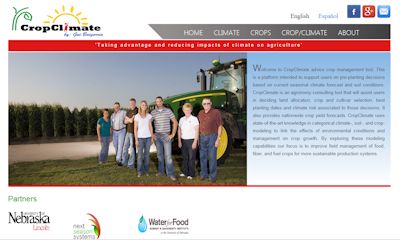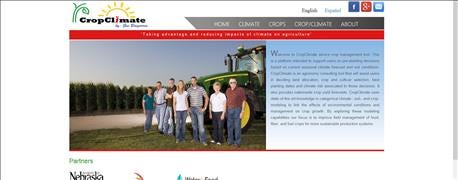January 18, 2016

The world's changing climate creates great uncertainty when it comes to agricultural decision-making. Computer models containing a sea of high-tech data on crops and climate present challenges in transforming terabytes into real solutions on the ground. A new tool developed by a University of Nebraska-Lincoln researcher in collaboration with the private sector has the ability to transform trillions of model realizations into a simple website platform that will help farmers reduce risk and optimize production while using water and other resources more efficiently.

CROPCLIMATE: The interactive website uses state-of-the-art technology in climate-, soil- and crop-modeling to link the effects of environmental conditions, weather and crop yield history and field management to develop more resilient crop production systems.
CropClimate, available to the public at www.cropclimate.org, was developed by Guillermo Baigorria, assistant professor in the UNL School of Natural Resources and Department of Agronomy & Horticulture and a Robert B. Daugherty Water for Food Institute Faculty Fellow. The interactive website uses state-of-the-art technology in climate-, soil- and crop-modeling to link the effects of environmental conditions, weather and crop yield history and field management to develop more resilient crop production systems. The platform offers insights that will enable farmers to tailor some of their pre-planting management practices, such as crop land allocation, variety selection, planting dates, insurance selection, etc., according to the upcoming seasonal climate forecast. The website is fully operational to support decision-making for corn and soybeans in Nebraska. Some tools are functional for the entire U.S., while others need to be added to certain states following the initial launch.
Baigorria has been working toward the launch of the data-intensive project, which requires 180 computer processors to run, for the past several months. He said he is confident the tool will help take some of the guesswork out of agricultural decision-making.
"Many growers make pre-planting decisions based on instinct, such as when to plant, how much land is assigned to a given crop, which cultivar to use or the insurance they buy," said Baigorria. "CropClimate's user-friendly format and extensive climate information can empower farmers, lenders, policymakers, seed and agrochemical companies, insurance companies and other stakeholders to make more informed decisions."
The website allows users to plug in various scenarios that will help them analyze the probability for highest yield, he said.
"The platform gives us the ability to translate an enormous amount of sub-county-level data on climate, soil and crops into field decisions that may significantly increase production, reduce risk and bolster our ability to take advantage of climate projections."
Roberto Lenton, founding executive director of the Water for Food Institute said this is the kind of innovation that supports the institute's mission to ensure water and food security. "The work of our Faculty Fellows is essential to advancing our understanding of the complexities involved in water use in agriculture. To have a free, web-based program that provides farmers with factual data to improve their yields and reduce water use is truly groundbreaking."
The project, which includes research, extension and education components, has reached an international scope. In parallel with the launch of its core model based in the U.S. in January, Baigorria expanded the platform's capacity internationally, beginning with Peru and Brazil, through a partnership with the International Consortium for Categorical Climate Forecast Applications. Baigorria is awaiting UNL approval to begin in Indonesia. Additional countries will have an opportunity to replicate the tool in the future.
Source: Robert B. Daugherty Water for Food Institute
You May Also Like




